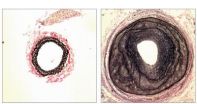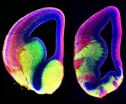(Press-News.org) Montreal, November 13, 2012 – The psychological scars of childhood abuse
can last well into adulthood. New research from Concordia University shows the harm can have longterm negative physical effects, as well as emotional ones.
Scientists hypothesize that stress in early childhood causes physiological changes that affect a victim's response to stress, which puts the individual at an increased risk of disease later in life. Jean-Philippe Gouin, who holds a Canada Research Chair in Chronic Stress and Health in Concordia's Department of Psychology, tested this link and found that early-life abuse results in physiological changes that may increase the risk of cardiovascular disease later on.
Along with colleagues from Ohio State University and the University of Missouri, Gouin looked at the body's biological response to naturally occurring stress. "We wanted to investigate whether abuse during childhood could have a lasting impact on the physiological response to stress in daily life," Gouin says. "Past research has evaluated the impact of early abuse on stress-response among young adults. We wanted to extend these findings to older adults."
The researchers spoke to 130 adults with a mean age of 65 about recent stressful events and their childhood abuse history. Participants completed an interview which assessed the occurrence of stressors in the preceding 24 hours. Some stressors included "having an argument with a partner" and "being stuck in traffic, resulting in being late for an important appointment." Blood samples were then taken from the participants to measure their levels of three biological markers.
The results of this study, which were recently published in the Annals of Behavioral Medicine, found that there were marked differences between two groups in one of the three biological markers. In abuse victims who reported multiple stressors in the preceding 24 hours, levels of interleukin-6 (IL-6), a protein that stimulates an immune response, were more than twice those of the participants who reported multiple daily stressors but no abuse history.
The findings from this study indicate that the impact of early-life abuse extend well into older age. "While the production of inflammatory markers such as IL-6 is essential to fight acute infection, its over-production has been associated with the development of age-related diseases, such as cardiovascular disease," says Gouin. "An exaggerated IL-6 response to daily stressors may create a physiological state that, over several years, increases the risk of developing cardiovascular disease."
###
Related links:
Concordia's Department of Pyschology http://psychology.concordia.ca/
Jean-Philippe Gouin's Research @ Concordia profile http://www.concordia.ca/explore/#!/profile/3231/research
$1M in federal funding for top professors http://www.concordia.ca/now/what-we-do/research/20121016/head-1m-in-federal-funding.php
Source: Cléa Desjardins Senior advisor, media relations University Communications Services Concordia University Phone: 514-848-2424, ext. 5068 Email: clea.desjardins@concordia.ca Web: concordia.ca/now/media-relations Twitter: @CleaDesjardins END
Childhood abuse leads to poor adult health
Adults victimized as children are at an increased risk for disease
2012-11-13
ELSE PRESS RELEASES FROM THIS DATE:
Effects of alcohol on lymphoma, leukemia, and other types of hematological cancers
2012-11-13
Many observational epidemiologic studies have found an inverse association between alcohol consumption and hematological cancers (such as lymphoma and leukemia). This study, based on the Million Women's Study in the UK, is large enough to permit an evaluation of associations with various types of such cancers. Further, it takes into account newer coding systems for morphology so that diseases associated with the lymphatic system can be separated from those of the myeloid system.
The key findings are that alcohol consumption appears to lower the risk of several types ...
G proteins regulate remodelling of blood vessels
2012-11-13
This press release is available in German.
Blood vessels are extremely dynamic: depending on the external conditions, they can adapt their permeability for nutrients, their contractility, and even their shape. Unlike cardiac muscle cells, for example, the smooth muscle cells in blood vessels demonstrate a high degree of plasticity, so they can specialise or multiply as required, even repairing damage to the vessel wall. This vascular remodelling is evidently precisely regulated. Disruptions are extremely significant in conditions such as atherosclerosis or high blood ...
It pays to cooperate
2012-11-13
CAMBRIDGE, MA - Many species exhibit cooperative survival strategies — for example, sharing food or alerting other individuals when a predator is nearby. However, there are almost always freeloaders in the population who will take advantage of cooperators. This can be seen even among microbes such as yeast, where "cheaters" consume food produced by their neighbors without contributing any of their own.
In light of this, evolutionary biologists have long wondered why cooperation remains a viable survival strategy, since there will always be others who cheat. Now, MIT physicists ...
How online video stream quality affects viewer behavior
2012-11-13
AMHERST, Mass. – It may seem like common sense that the quality of online video streaming affects how willing viewers are to watch videos at a website. But until computer science researcher Ramesh Sitaraman at the University of Massachusetts Amherst and collaborators at Akamai developed a way to rigorously study the question, no one had been able to scientifically test the assumption.
They conducted the first large-scale study of its kind to quantitatively demonstrate how video stream quality causes changes in viewer behavior. "Video stream quality is a very big topic ...
Once the conflict is over, solidarity in alliances goes out of the window
2012-11-13
This press release is available in German.
It is not always wise to form an alliance while in a conflict or at war, especially when there is something to be shared afterward. Economists from the Max Planck Institute for Tax Law and Public Finance have now shown by game theory experiments that, as soon as the enemy is gone, in-group solidarity of alliances vanishes rapidly. Former brothers in arms fight even more vigorously over the spoils of a victory than strangers do. During the conflict, they expend together only half the effort of their enemy. Furthermore, when ...
Watching the developing brain, scientists glean clues on neurological disorder
2012-11-13
CHAPEL HILL, N.C. – As the brain develops, each neuron must find its way to precisely the right spot to weave the intricate network of links the brain needs to function. Like the wiring in a computer, a few misplaced connections can throw off functioning for an entire segment of the brain.
A new study by researchers at the University of North Carolina School of Medicine reveals how some nerve cells, called interneurons, navigate during the development of the cerebral cortex. Mutations in a key gene behind this navigation system underlie a rare neurological disorder called ...
Glutamate neurotransmission system may be involved with depression risk
2012-11-13
Researchers using a new approach to identifying genes associated with depression have found that variants in a group of genes involved in transmission of signals by the neurotransmitter glutamate appear to increase the risk of depression. The report published in the journal Translational Psychiatry suggests that drugs targeting the glutamate system may help improve the limited success of treatment with current antidepressant drugs.
"Instead of looking at DNA variations one at a time, we looked at grouping of genes in the same biological pathways and found that a set ...
Baiting mosquitoes with knowledge and proven insecticides
2012-11-13
This press release is available in Spanish.
While one team of U.S. Department of Agriculture (USDA) scientists is testing the effectiveness of pesticides against mosquitoes, another group is learning how repellents work.
At the Agricultural Research Service (ARS) Center for Medical, Agricultural and Veterinary Entomology (CMAVE) in Gainesville, Fla., entomologist Sandra Allan is using toxic sugar-based baits to lure and kill mosquitoes. Allan and her CMAVE cooperators are evaluating insecticides and designing innovative technology to fight biting insects and arthropods. ...
Annals of Internal Medicine tip sheet for Nov. 13, 2012
2012-11-13
1. Prophylactic Probiotics Reduce Clostridium difficile-associated Diarrhea in Patients Taking Antibiotics
Prophylactic use of probiotics can reduce Clostridium difficile-associated diarrhea (CDAD). Clostridium difficile is a bacterium that can cause symptoms ranging from diarrhea to life-threatening inflammation of the colon. CDAD most commonly affects older adults in hospitals or in long term care facilities and typically occurs after use of antibiotics. Probiotics are microorganisms thought to counteract disturbances in intestinal flora, and thereby reduce the risk ...
November/December 2012 Annals of Family Medicine tip sheet
2012-11-13
52,000 More Primary Care Physicians Needed by 2025 to Meet Anticipated Demand
Researchers project the United States will need 52,000 additional primary care physicians by 2025 — a 25 percent increase in the current workforce — to address the expected increases in demand due to population growth, aging, and insurance expansion following passage of the Affordable Care Act. Analyzing nationally representative data, the researchers conclude population growth will be the single greatest driver of increased primary care utilization, requiring approximately 33,000 additional ...
LAST 30 PRESS RELEASES:
SfN announces Early Career Policy Ambassadors Class of 2026
Spiritual practices strongly associated with reduced risk for hazardous alcohol and drug use
Novel vaccine protects against C. diff disease and recurrence
An “electrical” circadian clock balances growth between shoots and roots
Largest study of rare skin cancer in Mexican patients shows its more complex than previously thought
Colonists dredged away Sydney’s natural oyster reefs. Now science knows how best to restore them.
Joint and independent associations of gestational diabetes and depression with childhood obesity
Spirituality and harmful or hazardous alcohol and other drug use
New plastic material could solve energy storage challenge, researchers report
Mapping protein production in brain cells yields new insights for brain disease
Exposing a hidden anchor for HIV replication
Can Europe be climate-neutral by 2050? New monitor tracks the pace of the energy transition
Major heart attack study reveals ‘survival paradox’: Frail men at higher risk of death than women despite better treatment
Medicare patients get different stroke care depending on plan, analysis reveals
Polyploidy-induced senescence may drive aging, tissue repair, and cancer risk
Study shows that treating patients with lifestyle medicine may help reduce clinician burnout
Experimental and numerical framework for acoustic streaming prediction in mid-air phased arrays
Ancestral motif enables broad DNA binding by NIN, a master regulator of rhizobial symbiosis
Macrophage immune cells need constant reminders to retain memories of prior infections
Ultra-endurance running may accelerate aging and breakdown of red blood cells
Ancient mind-body practice proven to lower blood pressure in clinical trial
SwRI to create advanced Product Lifecycle Management system for the Air Force
Natural selection operates on multiple levels, comprehensive review of scientific studies shows
Developing a national research program on liquid metals for fusion
AI-powered ECG could help guide lifelong heart monitoring for patients with repaired tetralogy of fallot
Global shark bites return to average in 2025, with a smaller proportion in the United States
Millions are unaware of heart risks that don’t start in the heart
What freezing plants in blocks of ice can tell us about the future of Svalbard’s plant communities
A new vascularized tissueoid-on-a-chip model for liver regeneration and transplant rejection
Augmented reality menus may help restaurants attract more customers, improve brand perceptions
[Press-News.org] Childhood abuse leads to poor adult healthAdults victimized as children are at an increased risk for disease


